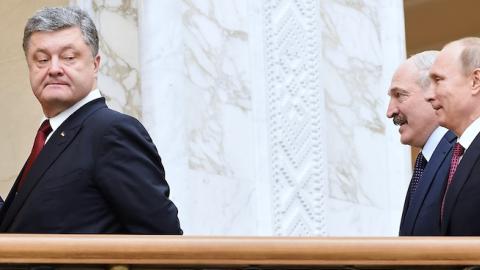The 28 member states of the European Council will convene later this month to debate whether to renew sanctions against Russia for its military aggression in eastern Ukraine and illegal annexation of Crimea. The sanctions package has been extended every six months since it was first adopted in July 2014. But some countries are now pushing behind the scenes for a gradual withdrawal of sanctions.
That would be a mistake. It’s not yet time to return to business as usual with Moscow. Lifting sanctions now would send a dangerous signal of weakness and division in Europe.
The specific sanctions up for renewal target industries such as energy, defense and banking. They were implemented following the July 2014 downing of Malaysia Airlines Flight 17 by Russian-backed rebels in eastern Ukraine. Removing these sanctions has been made conditional on Kremlin compliance with the so-called Minsk II Agreement, the February 2015 accord designed to de-escalate the Ukraine-Russia conflict. Kiev hasn’t always lived up to its obligations, but Moscow’s violations have been extensive, systematic and brazen.
Ukraine’s eastern border is still under the control of Russian-backed fighters. Russian troops and mercenaries still stalk Ukrainian territory, and they continue to use heavy weaponry, all in violation of the accord.
Europeans shouldn’t be fooled by symbolic gestures of goodwill such as President Vladimir Putin ’s decision to free jailed Ukrainian pilot Nadiya Savchenko, however welcome. These moves are perfectly timed to appeal to those in Europe who long for restored relations with Russia, but amount to paltry progress on the ground.
Sanctions haven’t been altogether ineffective, either. Combined with the drop in oil prices, sanctions have taken a toll on the Russian economy, leading in 2015 to an estimated 3.8% contraction in gross domestic product. Related effects, such as reduced foreign investment and Moscow’s retaliatory sanctions, have sharpened the pain.
This economic situation is what led Moscow to the negotiating table at Minsk in the first place, largely freezing the situation on the ground. Removing the sanctions now, without progress, only encourages the renewal of hostilities.
These sanctions have hurt Europeans on a decreasingly smaller scale than they do Russia. As the European Commission had anticipated in late 2015, the effect on European economies, less dependent on Russia than Russia is on them, “remains contained,” particularly as European industries continue to find new, alternative markets and diversify their exports.
That doesn’t mean the impact is nonexistent: The European Parliamentary Research Service estimates that reduction in trade has cost European economies 0.3% of GDP in 2014 and 0.4% in 2015. But the economic aspect cannot be the whole picture.
In Russia, business interests and political motivations are often one and the same. As Moscow tends to leverage economic ties into political influence, gradual divestment from Russia increases Europeans’ ability to conduct their foreign policy autonomously. This should be welcomed. Further measures to roll back the influence of dirty kleptocratic money laundered in Europe, notably through real-estate investments, should accompany this.
Critics of the sanctions, such as Greece’s Prime Minister Alexis Tsipras, have argued that dialogue is the path forward. Western leaders should continue engaging Moscow. But effective dialogue and a robust stance on sanctions aren’t mutually exclusive. They reinforce each other. The current situation wasn’t created by Europeans or Americans but by Russia’s unilateral revision of the post-Cold War security order and invasion of a neighbor. This is what soured the dialogue in the first place.
The unanimous adoption of sanctions two years ago was a rare moment of solidarity and unity on strategic issues in Europe, a fact too little noticed at a time when Europeans are prompt to bash themselves and lament their own weaknesses. Opponents and supporters of Mr. Putin’s policies sometimes tend to overstate his strength and strategic prowess. Russia has much more to gain from lifting sanctions than Europeans. Western strategy should reflect that reality.
















